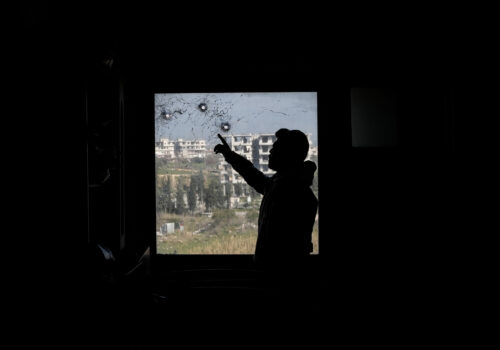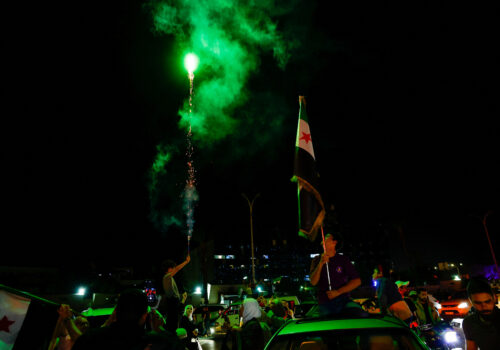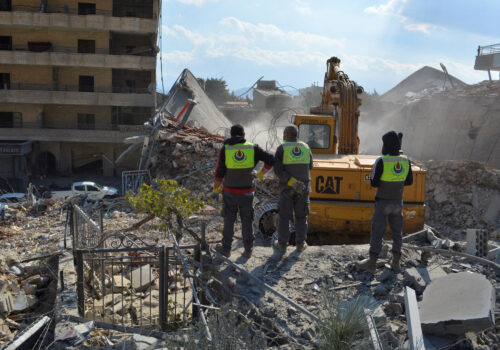Why DDR programs are the missing link to Syrian stability
The Syrian landscape after the fall of Bashar al-Assad’s regime faces a web of complex and interrelated political, security, economic, and social challenges. The transitional government is striving to build a fundamentally different state and to launch a comprehensive reconstruction process, supported by growing international engagement, particularly following US President Donald Trump’s decision to lift sanctions on Syria. While this shift has opened new opportunities for the government to benefit from international reengagement, it has also brought forth more intricate domestic obligations, foremost among them the launch of Disarmament, Demobilization, and Reintegration (DDR) programs, alongside broader Security Sector Reform (SSR).
In this context, the absence of DDR programs emerges as one of the most pressing challenges. The need for such programs remains critical to ensuring stability, preventing renewed unrest or a slide into violence, and providing adequate protection for all Syrian communities, most notably the Alawite community, which faces particularly delicate circumstances following the mass demobilization of military personnel from within its ranks. DDR efforts would also play a key role in creating a safe environment for the return of refugees.
Activating DDR programs has become an urgent necessity in light of lifting sanctions and renewed international momentum to support stability in Syria. These programs are critical to addressing the fragile conditions of communities that have long depended on military structures for their livelihoods and collective identity, chief among them the Alawite community. Without fair and sustainable institutional solutions, the risk of relapse into rebellion or renewed violence remains high, undermining prospects for national reconciliation.
Alawites: From army to militia
The Alawite community—the Syrian minority group to which the Assad family belonged— formed the backbone of the military and security apparatus under the former regime. With its collapse, hundreds of thousands of soldiers—most of them Alawite—were demobilized without being offered alternative pathways, particularly amid a deteriorating economic situation and the near-total absence of employment opportunities.
The transitional government limited its response to conducting settlement processes and disarming light and medium weapons, leaving the heavy ones on the battlefields, without establishing a comprehensive institutional framework capable of absorbing the large number of demobilized personnel, or providing them with viable alternatives to prevent their descent into armed violence—an undertaking that, even if politically desired, currently lies beyond the government’s capacity.
SIGN UP FOR THIS WEEK IN THE MIDEAST NEWSLETTER
Moreover, some former Alawite officers and commanders established armed militias that launched violent operations in early March 2025. These actions triggered retaliatory violence, resulting in the deaths of numerous civilians—including Alawites, Sunnis, and others from Syria’s coastal communities—as well as hundreds of security and military personnel. The clashes have entrenched a persistent state of insecurity that continues to this day.
While the regime’s remnant leaders may be driven by their own motives—such as evading transitional justice and exploiting sectarian rhetoric to portray themselves as protectors of the Alawite community against the transitional government—the absence of DDR programs continues to fuel these militias with new recruits. This dynamic has turned the situation into a pattern of intermittent rebellion and has opened the door for regional actors like Iran to intervene and exacerbate instability. Lasting stability in Alawite-majority areas—and elsewhere—will remain out of reach unless sustainable solutions are introduced to economically and socially reintegrate these individuals into the fabric of the new state.
DDR programs as a pathway to stability
Amid growing international openness and willingness to support Syria’s stabilization, DDR programs stand out as essential pillars for building lasting peace. Their value lies in their capacity to curb the proliferation of weapons and reduce the risk of internal conflict, particularly in areas that have experienced sectarian or tribal tensions. They help address the root causes of conflict by offering former combatants viable alternative pathways.
Similar programs were backed by the UN’s Development Program (UNDP) in Liberia and Colombia based on United Nations (UN)- integrated DDR standards (IDDRS). Implemented in parallel with a transitional justice process, these programs serve as a foundational mechanism. For example, in Colombia and Liberia, DDR served as a structured mechanism to transition combatants to civilian life. Comparable DDR programs in Liberia, Colombia, and South Sudan have demonstrated the importance of linking disarmament with social reintegration in reducing long-term conflict risks.
In line with these existing international standards, DDR programs follow a clear sequence: voluntary or mandatory disarmament, vocational and social rehabilitation, and eventual reintegration into civilian life or institutional structures. Their importance lies in their ability to reduce the likelihood of renewed violence, particularly in areas that have experienced sectarian tensions, such as Syria’s coastal region.
In the Syrian context, the issue of demobilized fighters from the Alawite community and others within a unified national framework helps foster trust among Syria’s diverse components, ensuring that no group feels targeted based on its political or sectarian background. These programs would also demonstrate the transitional government’s seriousness in addressing security and humanitarian concerns, laying the groundwork for attracting international support and securing the funding necessary to implement development and reconstruction plans.
The impact of DDR extends beyond internal stabilization; it also serves as a gateway to creating a secure environment that can rebuild refugee confidence in the safety of return. In doing so, it helps reposition Syria as a safe country, capable of reintegrating its citizens, both inside and abroad, under dignified and voluntary conditions.
A new opportunity, and and an urgent task
With the end of Western sanctions on Syria and the return of external support to the state-building process, the transitional government now faces a rare opportunity to address the imbalances of the post-conflict period. However, this international opening does not automatically guarantee stability unless accompanied by serious domestic measures, chief among them, the launch of DDR programs.
The current challenge is not only the lack of funding but also the absence of operational structures capable of absorbing such programs, weak institutional coordination, and growing security risks posed by uncontrollable local forces from the remnants of the regime or civil groups with a revolutionary background. In this context, DDR programs become a central tool not only for restoring security but also for rebuilding trust between the state and society and paving the way for genuine national reintegration.
Although the Western-led international community continues to stress the importance of protecting minority communities in Syria, particularly the Alawites, the core challenge now lies not only in the lifting of international restrictions but in the transitional government’s ability to translate that commitment into effective policy. Without creating institutional and economic environments capable of absorbing demobilized fighters and reintegrating them into society, protection efforts will remain vulnerable to failure, and stability will remain fragile, regardless of available resources or declared intentions. In this space, the government’s seriousness about rebuilding the state will be truly tested.
A “collaborative fund” as a practical solution
With international willingness to support Syria’s stabilization now in place, the need arises for establishing a “Collaborative Support Fund” dedicated to financing DDR programs, similar to models implemented in Iraq, Sudan, Gaza, and others. This fund would operate under the direct supervision of the Syrian government and in partnership with neutral third parties. It would aim to manage financial resources for DDR programs transparently and efficiently, ensuring their use in the rehabilitation and economic and social reintegration of former combatants, including marginalized groups such as demobilized Alawite fighters who may fall outside the scope of transitional justice mechanisms.
A portion of the fund could also be allocated to support other conflict-affected groups, such as wounded opposition fighters, thereby promoting balanced justice and contributing to repairing Syria’s social fabric. This mechanism would also create a broader space for partnership, allowing both Arab and Western countries to contribute within an integrated framework subject to international oversight, thus minimizing the risk of political manipulation or misuse of funds.
In this context, Arab states—particularly those in the Gulf—could be crucial in filling key funding and technical gaps, especially as many have adopted more open positions toward the new Syrian administration. The Gulf states have previously contributed to stabilization funds in Yemen and Iraq, offering a precedent for such involvement in Syria’s DDR efforts. With their considerable financial capabilities and accumulated experience, Arab countries are well-positioned to serve as active partners in funding DDR programs. However, the success of this role will remain contingent on close coordination with the wider international community.
Stability hanging in the balance
Syria cannot fully turn the page on its conflict unless realistic guarantees are put in place to prevent the resurgence of violence or the drift of demobilized fighters toward rebellion. As such, the post-Assad reconstruction process cannot be completed without fundamentally addressing a set of sensitive issues, chief among them the sanctions regime and the critical role of DDR programs in laying the foundations for stability and ensuring the protection of minority groups, both as a domestic imperative and an international responsibility.
However, DDR programs are not a silver bullet despite their strategic importance. Their success depends on a supportive political, economic, and social environment, ensuring sustainability. This requires an integrated framework of transitional justice, economic revitalization, and inclusive participation by all societal components in shaping the country’s future. Without such coherence, DDR initiatives risk failure, co-optation, or losing their intended role as tools for building trust and long-term stability.
The current opportunity—bolstered by broad international support—must not be wasted. Failure to activate these pathways would represent a serious setback for Syria’s future, potentially reopening the door to renewed conflict and the resurgence of extremism. Conversely, if the transitional government succeeds in operationalizing DDR programs and mobilizing international support to rehabilitate society and kickstart development, it could mark a pivotal turning point in Syria’s modern history. In doing so, the country would be able to protect and advance minority rights within a new state that exercises its authority fairly and equitably under the principles of citizenship, just like for all other Syrians. This would pave the way for a renewed social contract through which Syrians can once again believe in their homeland and a shared, hopeful future.
Muhsen al-Mustafa is a researcher at the Omran Center for Strategic Studies. He can be found on X @MuhsenAlmustafa.
Further reading
Wed, May 28, 2025
Sectarianism, social media, and Syria’s information blackhole
MENASource By
Since Assad’s December ousting, Syrians have struggled to sift the truth from fake claims about security incidents across the country.
Tue, May 13, 2025
Experts react: Trump just announced the removal of all US sanctions on Syria. What’s next?
New Atlanticist By
Our experts provide their insights on how the removal of US sanctions on Syria would affect the country and the wider region.
Tue, Mar 25, 2025
Dispatch from Bekaa: Inside the sectarian skirmishes on the Syria-Lebanon border
MENASource By Nicholas Blanford
Local Shia tribesmen have battled an assortment of Sunni jihadist militias and the new Syrian security forces dominated by Hayat Tahrir al-Sham (HTS).
Image: Security personnel checks a man in a motorcycle at a checkpoint set up to confiscate stolen items, in Latakia, Syria March 14, 2025. REUTERS/Khalil Ashawi


